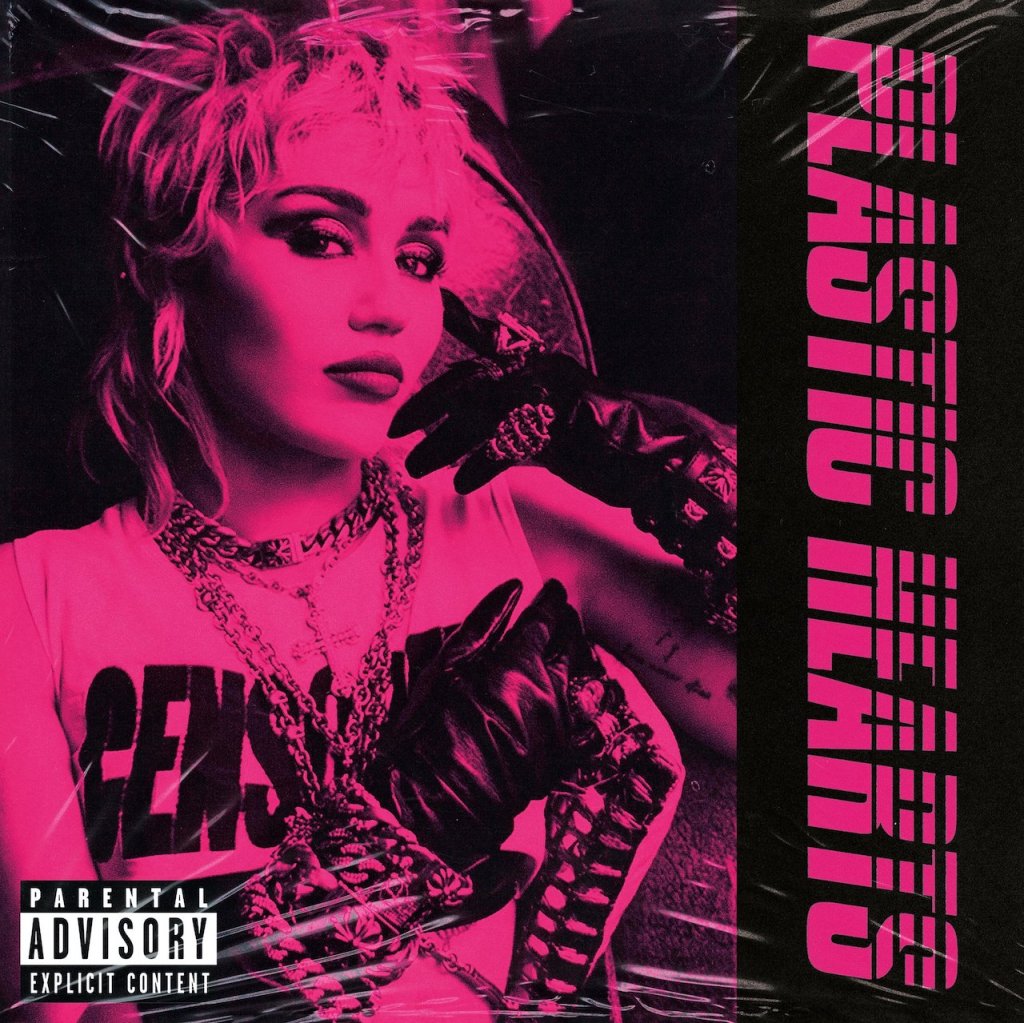The opening moments of Miley Cyrus’ new album, Plastic Hearts, is nothing but crunchy, throbbing guitar. It’s the sound of having a beer with a friend in a smoky dive bar. It’s the slight, jarring buzz of a flickering neon light. It’s the sound of one of the world’s biggest pop acts – used to selling out arenas – losing herself in a fog of cigarette smoke in a dingy yet hearty pub. But, with fiery eyes hidden by jet-black sunglasses, Miley Cyrus strutted her way through the haze and emerged with her strongest album to date, and one of the strongest of the year.
‘WTF Do I Know’ wastes absolutely no time in letting Cyrus reintroduce herself. It’s a heart-racing, speeding track that sees Cyrus throw herself straight into the fray, being completely unapologetic about her shortcomings and the hearts she shatters in the process. It doesn’t read as cold or heartless, but angry. She could be scorned, sure, but it feels more like frustration with her own inability to do what’s right for herself and others.
She’s bound to her recklessness, like some toxic waltz, which is a theme she continues to unpack throughout the rest of the album. ‘Prisoner’ with Dua Lipa, the album’s one conventional collaboration, puts this frustration under a different lens. At the beginning of Plastic Hearts, she was a tornado destroying whatever was in her path. But on ‘Prisoner’, her rasp alongside Lipa’s luxe make for a duet pleading for their inner tornadoes to subside. “Why can’t you, why can’t you just let me go?” they sing, begging for freedom but fearful for loneliness.
The collaborations on Plastic Hearts are easily the biggest indicator of what type of album this is without hearing it. There’s the searing and stalking ‘Night Crawling’ alongside Billy Idol, that takes the best of ’70s horror pop – ‘Thriller’ and ‘Horror Movie’ – and puts it over a rolling guitar line with eerie, Blade Runner-inspired keys glistening around it. The two match each other growl for growl and grunt for grunt as haunting howls float throughout the song’s electrifying chorus. Then, there’s sensual and taunting ‘Bad Karma’ with Joan Jett, with the two skulking around, whip in hand and cherries in mouth, with a brief but eruptive drum-led middle 8.
Miley Cyrus is a star, no matter what genre she places herself in, and she shines brightest on her own. But, with a raspy voice and southern twang like hers, this complete, up-and-down rock ‘n’ roll sound she’s embraced suits her like never before.
She shows it on songs like ‘Angels Like You’, which is honestly just a modern interpretation of a power ballad. Embodying the spirit of legends like Bonnie Tyler, she clutches her heart and sings in anguish as she begs her lover to leave her, due to aforementioned shortcomings – “It’s not your fault I ruin everything / And it’s not your fault I can’t be what you need / Baby, angels like you can’t fly down hell with me.” There’s the Nine Inch Nails-flavoured ‘Gimme What I Want’, where she sings that pleasure and the pain feels the same to her. The chanting chorus, over a stomping beat, screams of masturbatory assertion and unwavering independence as she sings “Gimme what I want or I’ll give it to myself”.
While Plastic Hearts is predominantly a rock-drenched album, that both of her impeccable ‘Heart Of Glass’ and ‘Zombie’ covers appear on as bonuses, she also can’t resist dabbling in other genres. Lead single ‘Midnight Sky’ is a neo-Pat Benatar anthem that dances closer to the pop side of the spectrum, and the Stevie Nicks remix of the song that appears towards the end of the album coats with an extra layer of magic. There’s the sunnier country-pop introspection on ‘Hate Me’, which harks back to some of the oft-forgotten earlier work of Miley’s career – 2017’s Younger Now but with far more honesty and grit.
She continues to play with her roots on the album’s phenomenal closer, ‘Golden G String’. Miley’s voice has an unheard clarity that has been absent throughout Plastic Hearts, as she sings in front of lush strings and sunlit guitar strums of acceptance and coming to peace with her reality.. “I know you think I’m crazy but have you looked around this place? I should walk away, but I think I’ll stay,” she sings in a heartfelt chorus, Thelma and Louise-ing it as she walks back into the fire of her recklessness, and the chaos around her, with a smile on her face and her arms open wide.
Miley Cyrus is a product of Hollywood and the star system, and she’s tried very hard to break the public’s perception of her. As a result, she’s shed many skins throughout the course of her career, but never has she sounded more authentic than she does on Plastic Hearts. In an attempt to be a glamorous version of anarchic, and a punk when punks are everywhere, she’s found a sound that fits her like a leather studded glove. Her distinct vocals melt perfectly with searing guitar riffs, and she does it all with such conviction that it’s hard to imagine a pre-2020 Miley Cyrus.
Calling her a rockstar would be doing her a disservice, because on Plastic Hearts, she is so much more. She’s pop, she’s country, she’s frustrated, she’s overwhelmed, she’s torturous, she’s victimised, she’s cheeky and she’s sincere. But, above all else, Miley Cyrus is finally home.
–












